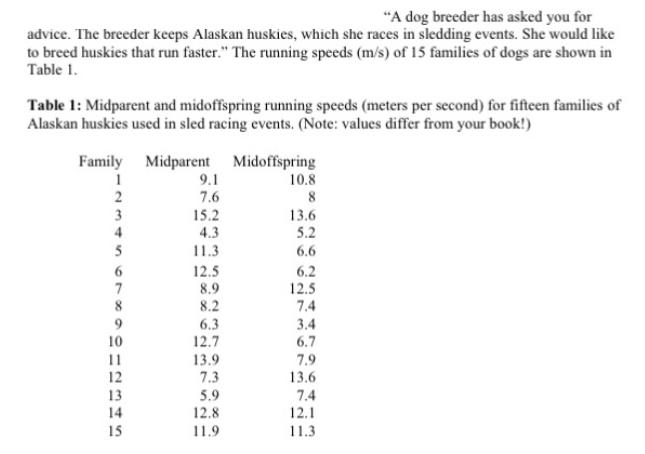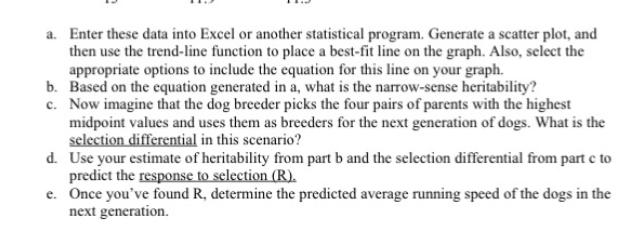Answered step by step
Verified Expert Solution
Question
1 Approved Answer
A dog breeder has asked you for advice. The breeder keeps Alaskan huskies, which she races in sledding events. She would like to breed


"A dog breeder has asked you for advice. The breeder keeps Alaskan huskies, which she races in sledding events. She would like to breed huskies that run faster." The running speeds (m/s) of 15 families of dogs are shown in Table 1. Table 1: Midparent and midoffspring running speeds (meters per second) for fifteen families of Alaskan huskies used in sled racing events. (Note: values differ from your book!) Family 1 Midparent 9.1 Midoffspring 10.8 2 7.6 8 3 15.2 13.6 4 4.3 5.2 5 11.3 6.6 6 12.5 6.2 7 8.9 12.5 8 8.2 7.4 9 6.3 3.4 10 12.7 6.7 11 13.9 7.9 12 7.3 13.6 13 5.9 7.4 14 12.8 12.1 15 11.9 11.3 a. Enter these data into Excel or another statistical program. Generate a scatter plot, and then use the trend-line function to place a best-fit line on the graph. Also, select the appropriate options to include the equation for this line on your graph. b. Based on the equation generated in a, what is the narrow-sense heritability? c. Now imagine that the dog breeder picks the four pairs of parents with the highest midpoint values and uses them as breeders for the next generation of dogs. What is the selection differential in this scenario? d. Use your estimate of heritability from part b and the selection differential from part c to predict the response to selection (R). e. Once you've found R, determine the predicted average running speed of the dogs in the next generation.
Step by Step Solution
There are 3 Steps involved in it
Step: 1

Get Instant Access to Expert-Tailored Solutions
See step-by-step solutions with expert insights and AI powered tools for academic success
Step: 2

Step: 3

Ace Your Homework with AI
Get the answers you need in no time with our AI-driven, step-by-step assistance
Get Started


